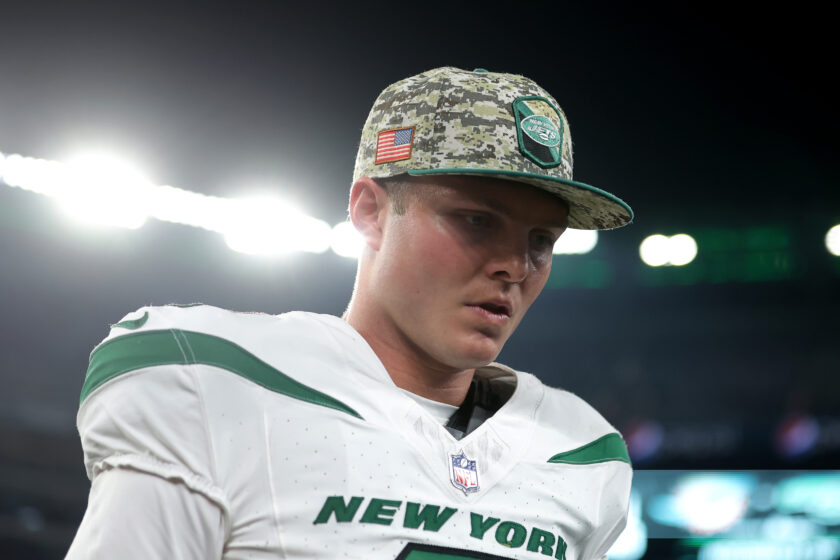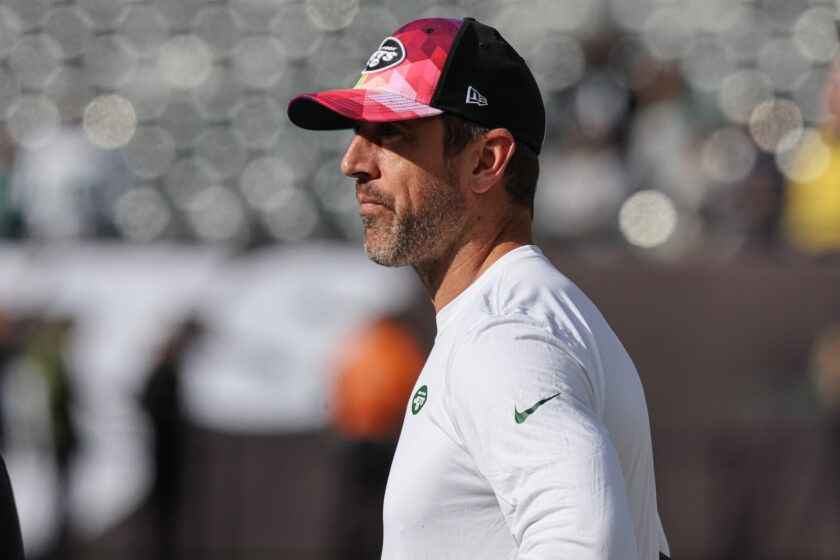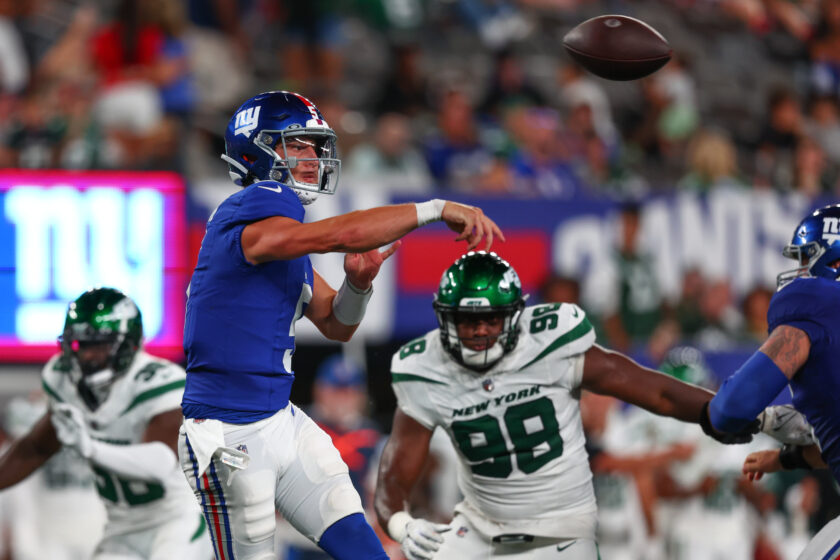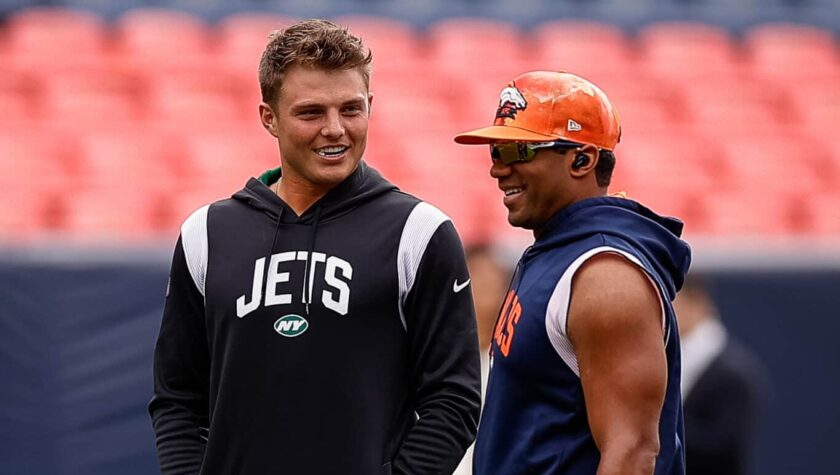New York Jets: The Sole Reason Matt Forte Is An Upgrade Over Chris Ivory
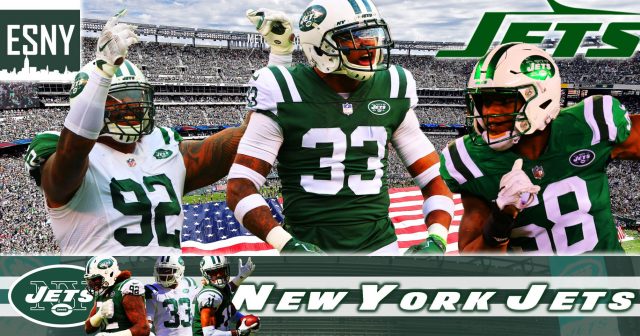
Despite Chris Ivory plowing down defenders in his unique style, there is one specific reason Matt Forte is an upgrade for the New York Jets.
[sc name=”Robby Sabo” ]If there was one universal term Rex Ryan began as head coach of the New York Jets that has caught on like wildfire in NFL football circles, it’s that of “ground-and-pound.”With the likes of Thomas Jones, Leon Washington, Brad Smith, Shonn Greene, and Alan Faneca in tow, the Jets under Ryan were a ground-and-pound offense. Run first, run second, and then run again.
Since then, any NFL offense slightly resembling a heavy run-first one is automatically bestowed a tag of ground-and-pound.
The Jets with Chris Ivory were no different.
Fans loved the machine that was Ivory. Big, bruising, monstrous – for the last few years the Jets were unapologetic about how their beast of a running back would roll right through you.

It’s a style fans adore. Thank you Marshawn Lynch.
2016, however, brings something different. Ivory is now in Jacksonville and 30-year old veteran Matt Forte will be the featured back in Florham Park, reunited with wide-out Brandon Marshall from their Chicago Bears days.
It begs the question, “Have the Jets truly upgraded at running back?”
The short answer is yes, they have. The long answer for why, is many. The true one answer for why it’s an upgrade is simple: Going from Ivory to Forte improves the offense based on versatility alone.
Whenever Chris Ivory is lined up in the backfield, NFL defenses understand the likelihood of a run is immense. His poor pass receiving skills limit what an offense can do when Ivory is in the game.
The distribution between using Ivory and Bilal Powell came at the expense of complete versatility from an offensive standpoint. If Ivory was in, a run was the norm. If Powell was in, the defense needed to be ready for an elaborate passing play with the running back possibly being involved.
With Matt Forte, all three downs will be versatile downs. Because Forte is a third-down type running back like Powell, the Jets will never tip their hand to the defense based on running back personnel alone.
It’s a simple concept that doesn’t need much explanation. Just look at the career stats of each player.
Chris Ivory:
- 4,031 RSH YDS, 24 TD, 4.6 YPC, 53 REC, 282 REC YDS, 2 TD
Matt Forte:
- 8,602 RSH YDS, 45 TD, 4.2 YPC, 487 REC, 4,116 REC YDS, 19 TD
Ivory simply has hands of stone. Without even realizing it, while watching from the comfort of your living room, his hands hurt the Jets offense to levels not even realized.
As fans you see the effort Ivory puts in on every run. He’s a madman in shoulder pads, churning for every yard possible. But his limitations through the passing game hurt the team’s chances to fool a defense. His effort is needed “extra time” because of this failing in fooling the defense.
The defense expects run when Ivory is on the field and he battles for every inch.
Whether it’s Forte or Powell, run or pass is an option. Furthermore, any play is an option. These are two completely interchangeable backs that’ll seamlessly compliment each other on any down.
In a short-pass happy league such as the NFL in the year 2016, this concept is worth its weight in gold.
Here’s an example from Week 4 of last season. With Forte and the Bears hosting the Oakland Raiders, Jay Cutler lined his offense up in a singleback pistol 3 TE, 1 WR set. Although Oakland came with the traditional four-man rush, Forte’s role on the play was to show block for a couple seconds and release:
Cutler – even looking like he was going to go to his safety outlet in Forte the entire time – found him for a 10 yard gain on first down.
Two plays later, on a critical 3rd-and-7, the Bears lined up in a shotgun 3 WR set with tight-end Martellus Bennet standing up in a y-flex spot. Again, it was Forte who burned the defense:
Oakland’s defense did a poor job in accounting for him out of the backfield and Forte ripped off a 37-yard play.
For those who believe Forte is a speed-burner who’s going to make the Jets a much faster team, think twice. He’s not. In fact, Ivory might possess better top flight speed.
What Forte does have, that Ivory doesn’t, is a keen sense of the football field. That and versatility the Jets offense was desperate for.
When Powell was injured or out of the game in 2015, there was nobody to replace him. Brandon Marshall and Eric Decker are great at what they do. They’re not the shifty, get the ball to them in open-field types that NFL offensive coordinators lean on in tough situations. Quincy Enunwa was the closest thing to a Powell.
[sc name=”Jets Center” ]The Jets will miss Ivory in goalline situations. There’s no question about that. He’s a beast in short-yardage.
In this particular NFL, though, the goalline back can be a guy who carries the ball twice in a game. He can be the guy who sits on the bench all game until his number is called. Besides, what Chan Gailey loves to do on offense is spread ’em out and work underneath. Set up the run with a short pass-first mentality.
This philosophy works in today’s league, and Forte will bring subtle, yet immeasurable positives to the Jets offense.
Double the importance of that last thought if Geno Smith is the starting quarterback in August.

The fact that the Jets have two Powell-types in 2016 means the world to his offense.
Forte playing at that scary age of 30 is a concern, but until we witness a major drop-off, let’s allow versatility to reign supreme.
NEXT: Development, Not Ryan Fitzpatrick, Will Be New York Jets 2016 Key
Robby Sabo is a co-founder, CEO and credentialed New York Jets content creator for Jets X-Factor - Jet X, which includes Sabo's Sessions (in-depth film breakdowns) and Sabo with the Jets. Host: Underdog Jets Podcast with Wayne Chrebet and Sabo Radio. Member: Pro Football Writers of America. Coach: Port Jervis (NY) High School. Washed up strong safety and 400M runner. SEO: XL Media. Founder: Elite Sports NY - ESNY (Sold in 2020). SEO: XL Media.
Email: robby.sabo[at]jetsxfactor.com



